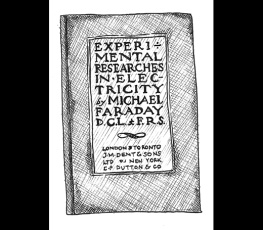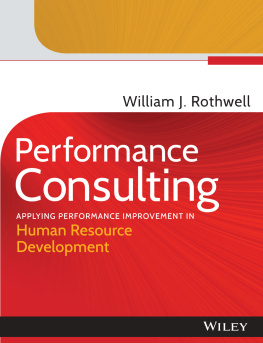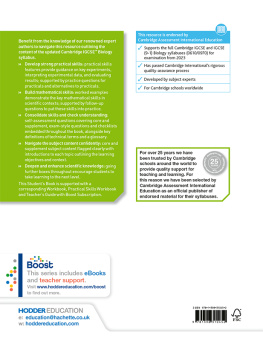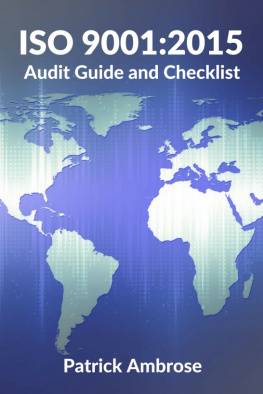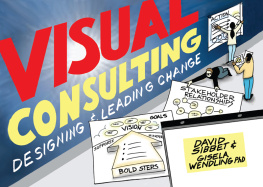MANAGERIAL CONSULTING SKILLS
A practical guide
To Charles Murphy
for his consulting advice and tuition
Managerial Consulting Skills
A practical guide
Second Edition
CHARLES J. MARGERISON
First published 2001 by Gower Publishing
First edition published 1988
Reissued 2018 by Routledge
2 Park Square, Milton Park, Abingdon, Oxon OX14 4RN
711 Third Avenue, New York, NY 10017, USA
Routledge is an imprint of the Taylor & Francis Group, an informa business
Copyright Charles Margerison 2001
Charles Margerison has asserted his right under the Copyright, Designs and Patents Act 1988 to be identified as the author of this work.
All rights reserved. No part of this book may be reprinted or reproduced or utilised in any form or by any electronic, mechanical, or other means, now known or hereafter invented, including photocopying and recording, or in any information storage or retrieval system, without permission in writing from the publishers.
Notice:
Product or corporate names may be trademarks or registered trademarks, and are used only for identification and explanation without intent to infringe.
Publishers Note
The publisher has gone to great lengths to ensure the quality of this reprint but points out that some imperfections in the original copies may be apparent.
Disclaimer
The publisher has made every effort to trace copyright holders and welcomes correspondence from those they have been unable to contact.
Typeset in Utopia by Bournemouth Colour Press, Parkstone.
A Library of Congress record exists under LC control number: 00042964
ISBN 13: 978-1-138-73356-5 [hbk]
ISBN 13: 978-1-315-18763-1 [ebk]
Contents
The Earth still goes round the Sun at the same speed. There are still 24 hours in each day, and 12 months in the year, but often it no longer feels that way. The satellites that circumnavigate Earth have brought us all closer together by speeding up communication.
When I emigrated to Australia in 1982, it took a letter seven days to reach me from the UK. If I replied on the same day, the person would therefore have received a reply in 14 days from the day it was sent. The arrival of the fax machine changed that. Instant communication. We thought that was virtual reality. Now, we live in the world of instant e-mail, and the magic of the World Wide Web, with digital video, and the facility for face to face discussion via cameras attached to our computers. The telecommunication and computer revolutions are changing our world. They are also changing the way we do business. Clients expect quicker and more efficient service. Yet, many of the problems are not resolvable by sending electronic messages. They are interpersonal team communication problems, and client relationship issues. It is therefore a pleasure to produce a second edition of my book, and to add new material on the latest issues. The book is even more relevant as we start a new millennium. The first edition focused on a range of innovative on the ground techniques for improving your own and other peoples performance at work. They are now widely used in most industries and have been applied in many countries and cultures.
Today, we have to work on the ground and in the air. The telecommunications revolution is forcing major changes in consulting and management practices. We are in an age where all managers have to be consultants, and consultants have to be more managerial in their approach. The issues covered are especially appropriate to the 21st century, where professional people will have to influence via their advisory skills, more than via the authority of their position.
Therefore, the new section of the book is called simply, New Developments. I have added two new chapters to reflect the way in which managers and consultants increasingly are thinking and acting. One of the chapters is on the way the www.com, www.org and www.net are increasingly central to the way we work and live. The other chapter is on how we need to speed up the process of continuing professional development to keep ahead of the game.
To be successful you need to learn quickly from experience. Easy to say, but hard to do when you are under pressure for results. You will need to constantly update your own skills and ability. The pace is so fast, you will have to learn as you go. This means action learning. It is increasingly the way individuals and organizations are going, as it provides real time learning and real time results. I have outlined my own experience in action learning, and the benefits I see that come from it.
The other new chapter looks at the way the World Wide Web is affecting consulting skills and client relationships. The Web is increasingly part of consulting assignments. However, in using this medium, there are considerable dangers. This chapter summarizes lessons from experience. It reviews a number of questions and answers on key issues. In particular, it looks at how consulting will be influenced by the new technology on such issues as marketing, communications, your own action strategies and client relationships management.
This book deals with the practical issues and applications based on real situations. I trust it is helpful to you in your career.
Charles Margerison
Gold Coast, Australia
I have spent a lot of time giving advice both as an internal and as an external consultant adviser. This book summarizes the key points I have observed and learnt on the way.
The consulting and advisory role in organizations is more important today than it has ever been. The speed and complexity of the modern organization demands that people specialize and offer advice based on their knowledge and experience. The modern organization depends as much on its professional advisers as it does on its managers or other staff.
In previous times, the nature and form of consultancy advice was more limited. Of course, legal and financial advisers have been long established. Today, they have extended their practices and services, and also been joined by a host of other consultant advisers. These range from safety advisers to insurance consultants, computer advisers, engineering specialists, personnel and training advisers and so on. All consultant advisers, whether external or internal, have to influence others if they are to do their job.
This book is written for all advisers, and for managers when they act as advisers. The focus is on the processes you can introduce to facilitate organizational improvement. This, I believe, is the main task of the managerial consultant adviser. It is often difficult to assess how effective you are, but your clients should be able to do things better and more efficiently after you have worked with them.
Throughout the book, numerous examples are given based upon personal experiences. I have not given details that would identify the clients concerned, in accordance with the confidentiality involved. The cases are there to illustrate general points. In that context, therefore, I have suggested guidelines and provided exercises that you can use to gain some personal assessment and development.
A number of people have helped me in the production of this book. My secretaries, Anne Dombrovskis, Lorraine Gardiner and particularly Jane Aberle, have ensured that the book was produced in an efficient manner. My clients, particularly Stewart McFarlane and Barry Smith, provided valuable insights. My colleagues Jim Kable, Geoffrey Prideaux, Bob Dick and Gordon Wills have read the manuscript and provided most useful advice. I also appreciate the support and advice of Dick McCann and Rod Davies, with whom I have worked on a number of consulting assignments. Also thanks to Jane Fielding for her advice and sub-editing, and to Malcolm Stern for his publishing initiative.



